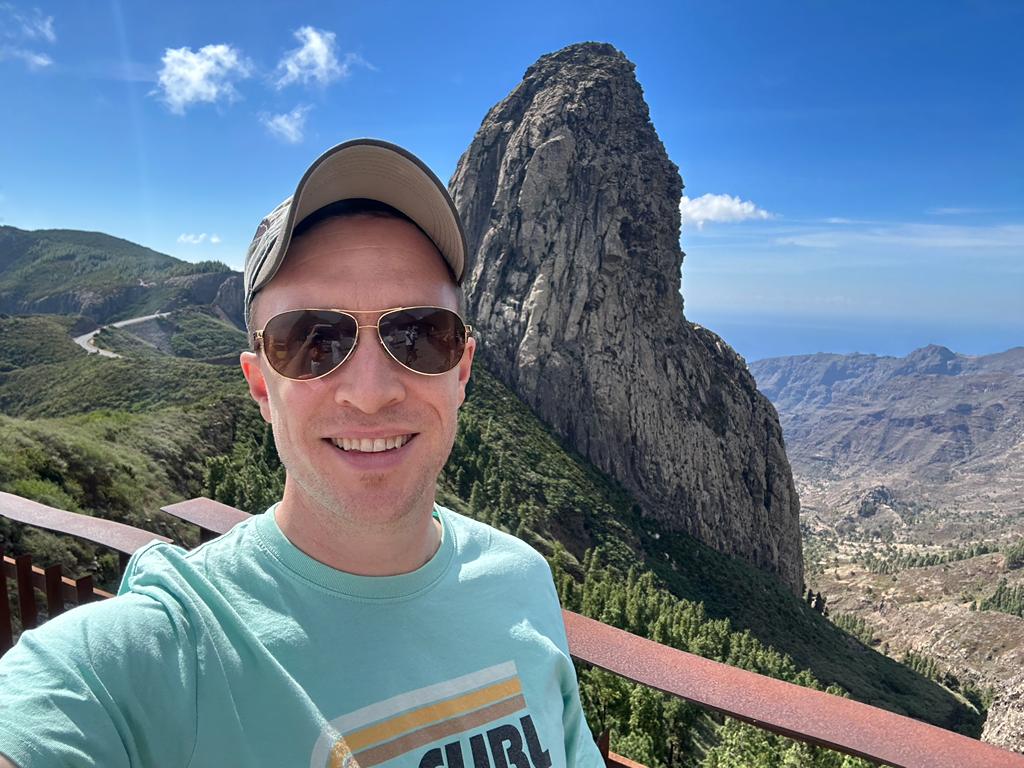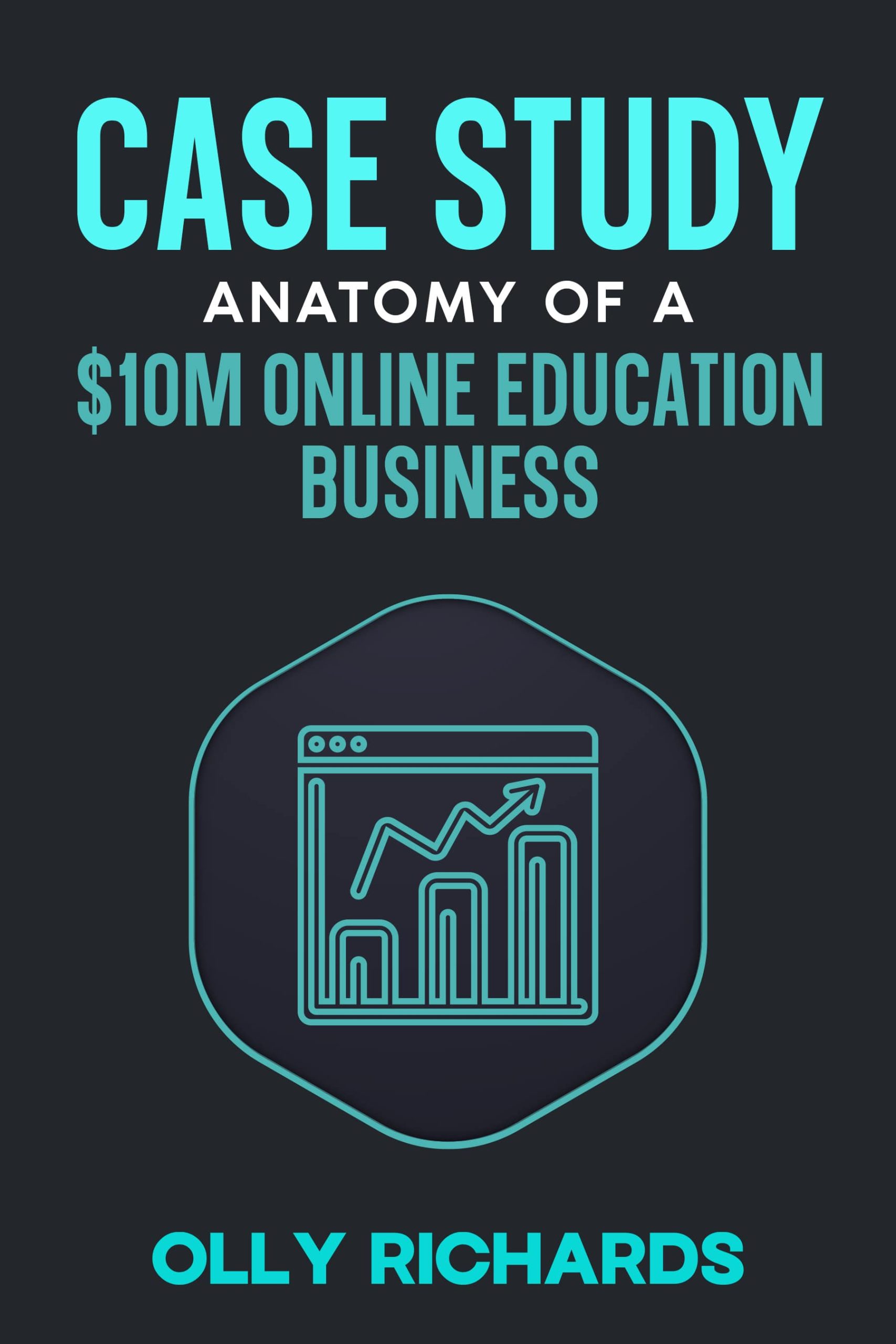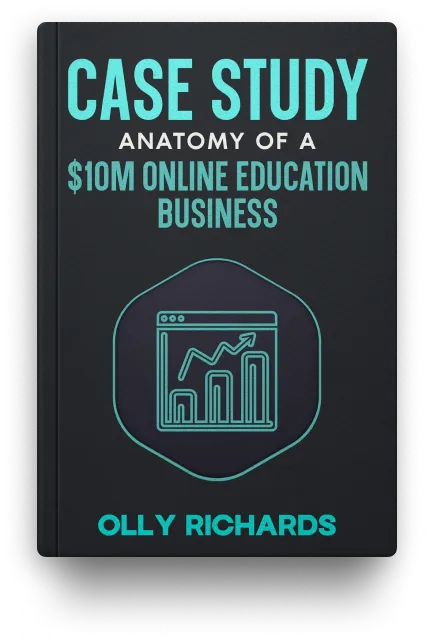Earlier this week, I talked to a friend who wants to scale his business.
It’s a pivotal decision for him.
Honestly felt like life-or-death.
Thinking about it afterwards, I felt like I was able to give my friend very useful advice… because I’d been through the exact same journey myself.
More:
Any entrepreneur who reaches 7-figures will inevitably face the same dilemma.
Then I thought:
“By Jove! That sounds like a mighty fine topic for a blog post!”

And so it shall be.
Unhappy With A 7-Figure Business
So here’s the situation.
My friend has a business in the online education space doing low 7-figures in revenue.
For most people, sounds like the dream.
But, he’s been hanging around in business circles, having all the typical ego-fuelled conversations around money, and now he feels dissatisfied.
What he wants:
- Scale from $1M to $5M
- Reach his “number” of $15M net worth
And this is pretty typical of what you’ll end up thinking about if you spend too much time in Type-A entrepreneur circles:
- Why haven’t you scaled yet?
- What’s your number, bro?
It’s all too easy to fall into the comparison trap, feel unworthy, and start to feel unsatisfied with your business.
And so my friend starts to ask:
“How do I scale? How do I can reach my number?”
In the rest of this newsletter, I’m going to dissect this situation in detail.
But before I do…
I want to plant a flag on the fact that my friend is:
Unhappy with a 7-figure business!
If you don’t have a 7-figure business, this will seem like insanity to you…
“WTF!? Unhappy with a 7-figure business?
But I want you to understand that this is very, very common…
And if you fail to understand why this is happening…
You risk living your whole life unhappy and anxious…
And only later in life, when it’s too late, will you look back and realise:
”Damn, I had it all… but I was too blind to see it.”
So, the main purpose of this newsletter is to convince you that you have a choice about scale.
And the alternative may well fits you better.
But you decide…
The Economics of 7-Figures
Like I said, it’s very common to be unsatisfied with a 7-figure business.
Let me break down how this is possible, using my friend as an example.
(I will exaggerate for effect, but the point stands.)
Let’s assume $1.2 million in annual revenue, and a 30% profit margin.
That leaves $360,000 in earnings.
Let’s assume he pays $113,000 in taxes on those earnings…
Leaving $247,000 profit net of taxes.
Let’s assume he takes half of that in dividends for living expenses…
So the company finishes the year with around $125,000 surplus.
Pretty standard for a company doing this level of revenue.
And some may say, pretty awesome!
But if your “number” is $15 million…
You’re in for a long wait.
In a nutshell, this is why a seven figure entrepreneur will be dissatisfied.
There’s a seemingly insurmountable gap between where you are, and where you want to be.
What’s the solution?
“Scale, baby!”
To Scale or Not to Scale?
Not so fast.
Spend any time in entrepreneur circles, or pay your average business coach, they will only suggest one thing to solve this “problem”:
Scale.
But the advice to scale is thrown around like last year’s fashion in a clearance bin…
Usually by people who have never actually done it.
Because if you ever encounter someone who has successfully scaled their business, you immediately discover one thing:
It’s hell.
Scale makes perfect sense on paper…
“Just 10X your revenue and you’ll reach your number. Easy!”
In reality, everything is hard:
- your content channels don’t scale
- you lose money on paid acquisition
- your organic marketing doesn’t work to paid traffic
- cold audiences don’t appreciate your product
- your business model doesn’t hold up
- expenses go through the roof as you try to figure it out
- margins shrink to the size of a peanut
- your life stops being fun
Everything in the above list is the cost of scale.
If you’re willing to stick it out for long enough…
Then you can come out the other side and be grinning like a Cheshire cat.
The truth of the matter is, most entrepreneurs aren’t cut out for that.
And the elephant in the room is:
You can go through five years of Hell, chasing scale, haemorrhaging money, sleepless nights, and minimal profit…
And while you may strike gold at the end…
And 90% of cases, you’ll end up thinking:
“Damn, I could have just taken it easy, enjoyed life, and pocketed a few million in the process!”
Like I said…
I’m exaggerating for effect.
But I need to do this, because it risks not sinking in.
Just because you heard about mega-rich entrepreneurs being idolised on the MFM podcast…
Doesn’t make you inferior for not chasing the same.
Where an Education Business Caps Out
So look…
I don’t want to flog a dead horse here.
You get the point that scaling is hard.
What I think is more interesting, is to understand where the growth of an online education business naturally caps out.
Because that makes the decision more salient.
Most founder-led online education businesses are successful because of two things:
- A dynamic founder who hustles for years
- Tonnes of free traffic from content (e.g. Youtube)
With a good size audience, this can easily generate mid six figures in revenue as a one-person business.
For those with a ridiculously big audience, they can hit 7-figures, but it’s important to realise that those people are the exception – even though you see them everywhere! (That’s survivorship bias in action )
Anyway…
Because people like us are never satisfied, when you decide to grow beyond 6-figures, you need to grow a team:
- customer support
- video editors
- product people
- whatever
A small team doesn’t cost much, relative to the size of the business.
And by adding a team, you can do a lot more, and reach 7-figures.
(If you build your business right, like I teach in my case study, this can be a mostly passive business, creating a really nice lifestyle for the founder.)
So this is how you build a $1 million business.
At StoryLearning, we first got to around $2-3m AR in this exact way.
Trouble is, when you get there, it doesn’t feel much like what “millionaire” should feel like, because you’ve also accumulated:
- costs
- paytoll
- taxes
- stress
Makes your early Creator days feel dreamy, dunnit?
You want more.
So you start to add s***:
- Group coaching
- Cohort-based courses
- Paid mastermind
- Agency or service
- Certification
(Usually because you’ve been pushed into it by a business coach or mastermind who can’t even spell the words “best interests”.)
And that’s how you can end up at higher revenue levels…
$2-5 million perhaps.
Except with 20% margins, you’re still only keeping $500,000 at the end of the year.
And you’re still nowhere near your $15 million number.
One day, you wake up one morning and realise you’ve built something you hate.
So you pack it all in.
Wishing you had just kept things simple, enjoyed life, and kept the cash.
Think I’m overblowing things here?
Then take a look at this devastating video from Vanessa Lau where she reveals exactly what happened to her:
(This video is quite something – kudos to Vanessa.)
The “Comfortable Maximum”
Anyway…
Based on what I’ve seen, there’s a “comfortable maximum” that a typical online business can reach.
That “comfortable maximum” falls between $1-3 million AR, depending on your business model.
To scale beyond this, you almost always need to take on huge costs in order to transform your business model for scale.
That’s when life starts to suck.
If you have a 7-figure business, but you’re not happy with your current profit margins…
Then why not just make your business more profitable instead?
It’s probably an easier tasks than mindlessly growing.
If you don’t think that’s possible…
You’re wrong.
Whenever I work with entrepreneurs 1-to-1, I can almost always add 5 figures of profit to their bottom line overnight, with a few simple efficiency adjustments that they were blind to.
Do you really need to be doing all the things you’re doing?
You should be able to run a 7-figure online business on 60-70% margins if necessary…
On a $1.5m business, that will give you $1m net to play with.
Remember…
- $10 million business at 10% margin
- $1.5 million business at 65% margin
Provide the exact same net profit.
But people are blind this because of ego.
The conclusion is obvious:
If you can generate $1-3 million with a high profit margin, and easy life, then in my view…
You’ve won.
And you should be highly suspicious of any little voice in your head that say you need far more in order to be happy.
And let me tell you something…
If you can’t live a good life on that kind of money:
You will be a lot more miserable with $15 million in the bank!
(one of the great paradoxes of money)
Conclusion
When you have nothing, “more” is good.
“More” is what made you successful.
And when “more” got you everything you have, your brain will cling onto it for dear life.
But once you’ve achieved success beyond any reasonable measure…
“More” starts to fail you.
I feel like the endless desire for “more” stems from a general confusion that comes from being in a very unique and lonely position:
- the loneliness of entrepreneurship
- the comparison trap that makes you feel inferior
- larger amounts of money breaking the model of the world you grew up with
- general fatigue
- the difficulty of finding people to talk to about this
Reason I’m telling you all this is because:
You have a choice.
I’ve seen too many entrepreneurs convince themselves that they need to scale – it’s life or death!
You don’t.
Stop it.
If you have built a 7-figure business that prints cash, then you’ve won at life.
The only person who can convince you otherwise is…
You!
You don’t “need” to scale.
You don’t “need” a $15 million exit.
A large team with an office is not a status symbol.
These emotions are all a direct result of attachment and fear-based emotions.
(I wrote a huge primer on this here.)
Anyhoo…
If it sounds like I’m getting a bit het up about all this…
It’s because I’ve been through the rollercoaster myself…
And I’ve seen what’s on the other side.
I feel fortunate that I’ve had friends and mentors who have helped keep me grounded in those moments where it all got a bit hairy.
Phil, Scott, Dan, Dave…
To name a few.
And, the biggest irony of this all is that, in spite of everything I’ve written here, I’m currently going through a gigantic scaling process in my company, StoryLearning.
Hah!
Does that make me a hypocrite?
I don’t think so.
Because I’m ready for it this time.
But that’s a story for another day.
Namaste,
Olly
CASE STUDY: Blueprint Of A $10m Online Education Business:
- Business model blueprint
- Product ecosystem
- Team structure
- Evergreen sales strategy
- And much more
Join my free newsletter for online educators and I’ll send you the case study immediately…
[tcb-script async=”” data-uid=”10c2395222″ src=”https://skilled-trailblazer-6490.ck.page/10c2395222/index.js”][/tcb-script]
We will protect your data in accordance with our data policy!


